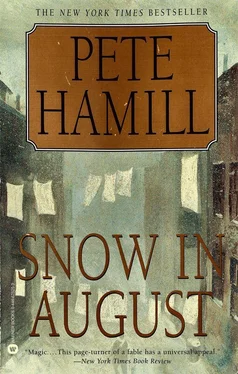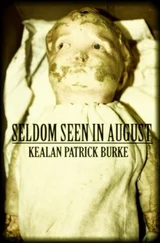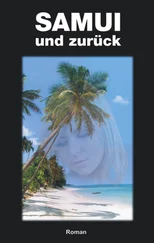On a frigid Thursday a week later, the huge leather book about Prague was back on the table, and the rabbi was showing him the routes he took each day to school when he was the boy’s age, moving easily into the Jewish Quarter called Josefeva. Now the rabbi’s words were full of magical images, as if he had remembered them during the week. Michael walked with the rabbi past black suns and black Madonnas, heading for Josefeva. In Old Town Square, Michael pictured Jews tied to the stake among soaring flames in the fourteenth century, their screams filling the air along with the odor of scorched flesh. Men in black robes piled on the wood. Children wept.
Then he was coming out of the house with Judah Hirsch, and the young man crossing the street was Franz Kafka, who was some kind of a writer. Kafka’s father ran a haberdashery right there, around that corner, in a building called the Kinsky Palace, and maybe that’s why Kafka always appeared in a black suit and a tight necktie and sometimes even a bowler hat. Then the boys went to inspect the glories of Pariszka Street. The name meant Paris in Czech. A Paris it wasn’t, the rabbi said, but it was pretty good anyway. They saw Kafka’s father, shouting, arguing with Judah’s father… what was the word? Debating . Michael heard Kafka’s father’s voice, high-pitched, angry, always right while everybody else was wrong, and his anger made Michael laugh. Then they were playing beside a fountain, with Kafka’s sisters. Ottla, Valli, Elli. Younger than the man who was some kind of a writer.
“All three die in the camps,” Rabbi Hirsch said, his eyes suddenly milky. “Kafka himself, he was lucky. Before Hitler he died, of the TB. The girls, they went to the camps.”
There was a finality to the last sentence that made Michael feel clumsy, as if his own curiosity had led the rabbi somewhere the man did not want to go. Maybe the spell had been broken. Maybe now the rabbi would close the book and leave Prague. Michael didn’t know what to say, but he did not want the rabbi to stop talking. Finally he stammered a few words.
“Tell me abut Josefeva.”
The rabbi shifted in his chair, cleared his throat as if gathering his strength, turned to another page of the book, and then reached into the past. He talked about a street called U Stareho Hrbitova, a street that was there in the book, and how if you hugged that gray stone wall, right there, and kept going, you would come to the heart of the old ghetto. Michael knew the word ghetto from the blue books. The rabbi talked about how Jews had been there since before the Czechs, perhaps from as far back as the time of the expulsion from Jerusalem. But the walls that sealed the Jews into the ghetto were not built for another thousand years. He described the wall to Michael, its porous stone and mossy base, the huge wooden gates, and how within the gates everything was separate from the rest of Prague. There was a Jewish court, a Jewish jail, even a Jewish post office.
“That was dumb,” Michael said.
“Yes, but a long time the dumbness lasted, right up to about 1850,” the rabbi said. “You know what is the most stupid? When the Christians sealed us in , they sealed themselves out .”
“From what?”
“From learning. From tradition.” A pause. “From miracles.”
Michael knew he couldn’t mean Catholic miracles, like the one about the loaves and the fishes or the water turned into wine at Cana.
“You mean, like… magic?”
The rabbi looked up from the book, and raised an eyebrow.
“Maybe,” he said. Another pause. “Magic, you like to hear about?”
“Yes.”
The rabbi took a deep breath, turned a page, and took Michael into another Prague, one that could not be described by geometry or science. A magical city of goblins and ghosts and doppelgangers (“a kind of bad twin,” the rabbi explained). In that city, Michael looked up and saw angels. Not fat little pink cherubs from greeting cards. Great silvery creatures with wings as wide as buses, dancing in clouds, swooping behind the spires. As big as Finn MacCool. In a narrow street called Golden Lane, he saw a man in a dark robe covered with silver stars, a man who looked like what the wizard Shazam might have looked like when he was young. Rabbi Hirsch said he was called an alchemist, part scientist and part astrologer. Michael knew an astrologer was a guy who could read the stars and make horoscopes like the ones in the Daily News that claimed they could predict the future and never did. These alchemists, the rabbi went on, were always trying to turn cheap metal, like lead or zinc or iron, into gold.
There were hundreds of them in Prague, brought from all over Europe by a mad emperor named Rudolf, who lived in the shadows of Hradčany Castle because his face was made of fruits and vegetables. There was even a painting of him showing radishes and carrots and onions where his nose and chin and ears should have been. One of Rudolf’s alchemists had invented a magic mirror where the future revealed itself through smoky glass. Another, bent and old, had spent his entire life searching for the philosopher’s stone, a single object, made of the hidden minerals of the earth, that would contain all wisdom and the secrets of eternal life. Another wore a silver nose and traveled with a dwarf and claimed to be 312 years old. All carried vials of sulfur and mercury. They studied stars and meteors and the movements of planets. They prayed to gods without names.
Wandering with Rabbi Hirsch in this ancient Prague, Michael felt mystery and wonder on all sides. They watched a man disappear in a puff of smoke. They passed the bodies of two alchemists who made gaudy promises to Rudolf and then failed to deliver; as punishment, they were covered with tinsel and hung with gold-painted ropes from gold-painted scaffolds. An innocent man was heaved from the upper story of Hradčany Castle and then two angels dove to his rescue. A slatternly women was transformed into a cow. A bird became a soldier. Donkeys danced. Metal trees bore iron fruit. Snow fell in August, the rain rose from the Vltava and hurled itself at the clouds, and once the sun appeared at midnight. Stars exploded and showered the earth with crystals. Ravens circled the evening sky and flew in and out of the gates of Hell.
“Magic everywhere,” the rabbi said. “In the Jews too. Maybe even more in the Jews.”
“What kind of magic?”
He stared at his hands.
“In the Jews, the magic of the Kabbalah,” he said.
The word itself sounded magical to Michael Devlin, lush with images of exotic places and gorgeous costumes, men with curved swords and women with bare bellies, in lands where minarets glinted in the sun. Turhan Bey and Sabu and Yvonne DeCarlo… Kabbalah, Where She Danced.
Those movie images were wrong. He returned in his mind to Prague and listened as the rabbi spoke of formulas passed across the millennia, whispered from one Jewish wise man to another from the time of Adam. Kabbalah, meaning the secret wisdom. And how the Kabbalah contained special alphabets and magic words, the most important of which, the most powerful, the most awesome, was the secret name of God.
“What is the secret name of God?” Michael asked.
“If I tell you, it’s a secret?”
“No, but why does He have a secret name? What’s the matter with just ‘God’?”
“God you don’t ask why He does things.”
Kabbalah was the true philosopher’s stone, as real as this drawing, in this leather-bound book, of a very special place Judah Hirsch had often visited with his father. Michael wanted to hear more about the Kabbalah and the secret name of God, but Rabbi Hirsch turned away from both subjects and traced a finger across the next drawing.
Читать дальше












